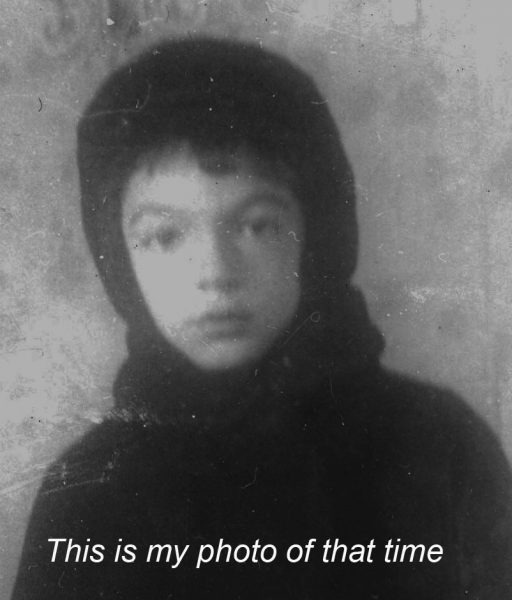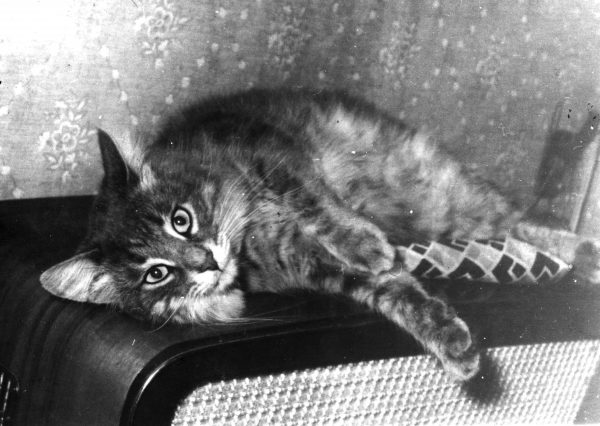Can a Cat be a Jew?
 I was born and spent all my childhood in Astrakhan, the city in the delta of Volga the largest European river near the Caspian Sea. I was born in 1946, just a year after the Second World War, so as a result I had many “baby boomer” kids of the same age around me. Astrakhan is a very old city, which played an important role in a trade between Persia and Russia. In the old time, habitants of the city mostly consisted of merchants, boat-builders, and craftsmen. Every successful merchant or craftsman had his own yard of about one acre surrounded by buildings that were necessary to run his business. Usually, the yard also included owner’s house, a large kitchen, and a few dining rooms (one for the master’s family, and another one for workers and servants). Servants and some of the workers often lived on the yard in small apartments. From 2 to 6 yards, depending of the size, made a block, thus each yard had an access to a street. The yards located on the canals that penetrated the city, belonged to successful merchants, and they stood out by their wealth. During the last couple centuries trade has declined, and after the Revolution of 1917 the trade completely died, but the structure of the city stayed the same.
I was born and spent all my childhood in Astrakhan, the city in the delta of Volga the largest European river near the Caspian Sea. I was born in 1946, just a year after the Second World War, so as a result I had many “baby boomer” kids of the same age around me. Astrakhan is a very old city, which played an important role in a trade between Persia and Russia. In the old time, habitants of the city mostly consisted of merchants, boat-builders, and craftsmen. Every successful merchant or craftsman had his own yard of about one acre surrounded by buildings that were necessary to run his business. Usually, the yard also included owner’s house, a large kitchen, and a few dining rooms (one for the master’s family, and another one for workers and servants). Servants and some of the workers often lived on the yard in small apartments. From 2 to 6 yards, depending of the size, made a block, thus each yard had an access to a street. The yards located on the canals that penetrated the city, belonged to successful merchants, and they stood out by their wealth. During the last couple centuries trade has declined, and after the Revolution of 1917 the trade completely died, but the structure of the city stayed the same.
Our family occupied the second floor the former master’s kitchen. The kitchen was a two-floor brick building with a basement. To avoid confusion, I have to say that the ground floor in Russia is called the first floor. The kitchen itself actually was on the first floor, and originally was connected with the second floor by a small hand operated lift to deliver dishes with a food up and dirty dishes down. Our apartment probably was used to keep all diner accessories. It was a very unpretentious dwelling. For comparison, a friend of mine lived in a part of the former master’s suite with high beautifully crafted ceiling, fireplace, parquet floors, etc.
About twenty families lived on our yard at that time, and about ten kids, boys and girls of my age were running wild. Of course, sometimes we quarreled, but that did not last long, and we always united in the front of the common “enemy”, which were kids from another yard. So it was a normal, half-hungry, after war childhood.
The climate in Astrakhan was very contrast. Summer was hot with dry air from the nearest desert, which burned your lungs. By the midday, asphalt became liquid, and everything alive disappeared in cracks. So during the hottest period of the day inhabitants tried to stay in the house with closed windows and freshly washed wooden floors. Winter was very cold and windy. The Volga River and all canals have covered by about a foot thick ice field, and I remember, I liked to watch how man saw the ice into 1 by 3 feet pieces, loaded them onto horse tracks, placing hay between peaces in order to protect them from freezing together, and then transported them into a storage to use in summer time as cooler.
There was no central heating, and so we used coal and wood as a form of fuel. The wood and coal was kept in small sheds on the yard. By the morning the heat was gone, and you would wake up to a chill breeze. Usually in the morning, my mother would clean the stove, and bring in the coal and wood. But this morning it was my school vacation, and she asked me to bring in the wood and coal while she will clean the stove. Obviously, I did not want to go, because it was cold and windy outside, but I did not have much choice, since I had to earn the breakfast. I knew it was only going to get colder if we did not heat this house, so I put on my coat as fast as I could, took a bucket for the coal and a bag for the wood, and ran down to the shed.
Every family had its own shed on the yard, and we never bothered to put locks on them. When I opened the door and my eyes adjusted to the darkness, I saw our cat Grey hanged with a notice hanging from the rope. And on the notice, though obviously misspelled, I read: ЖЫД (KIKE).
I couldn’t cry. I removed my cat from the rope. He was already frozen like stone. I gently put him down on the ground, to an onlooker it would seem as though I thought the cat was made out of the frailest of glass. Automatically, I filled up the bucket with coal, took a few pieces of wood, carefully closed the door, and ran home. During breakfast, my mother asked me if everything was OK, I answered that I was fine, but wanted to go out and play on the yard for a while, she allowed me to go, but not for long, since it was really cold.
In the shed we kept an axe, and I started to attempt to dig a grave with the axe. Somehow, though I don’t remember how, or how long it took, but I managed to actually dig that hole. I wrapped my cat into an old bag, which I found in the shed, and buried him. And suddenly I started to cry, I felt sorry for the cat, and them the feeling changed into being sorry for myself. And I wasn’t just feeling sorry because I lost my pet, but I also, in those same minutes, lost my friends. It was not out of malice to me that they killed him, it was just because the cat was Jewish’s cat.
The earliest I remember we had a puppy that lived with us for a year or two, but suddenly he disappeared. I was very small and don’t remember that whether I got very upset, but I remember I asked to get me another puppy. My father categorically refused to have another dog, but brought a cat, black with white collar. The cat soon also disappeared. My father told me that the cat probably got sick and left the house to die. Then we had black and white cat, and the last one was Gray. The same day father asked me if I have seen Gray. I said, No. A week or two later when I was doing my homework he asked me if I want to have another cat. Without looking at him I said, that no, I don’t want to have a cat anymore. He was standing nearby and thinking what to say, I heard his heavy breath, but did not say anything and went in his retrieve, the workshop. I squeezed my teeth in order not to burst out crying.
About nine years later I was accepted in Moscow Institute of Fine Chemical Technology and left the house. My older brother already four years as lived on Far East. My parents were left alone. Before leaving to Moscow I saw a homeless gray kitty on the street. The kitty was in a very bad shape, and I did not know what to do, to take him home or leave him on a street to die. That Gray lived with my parents for seven or eight years. Time has changed.
 This is a photo of the second Gray. He lies on a radio-receiver, because the top was always warm. When we emigrated I took this photo with me.
This is a photo of the second Gray. He lies on a radio-receiver, because the top was always warm. When we emigrated I took this photo with me.
Upper Saddle River, 2001
